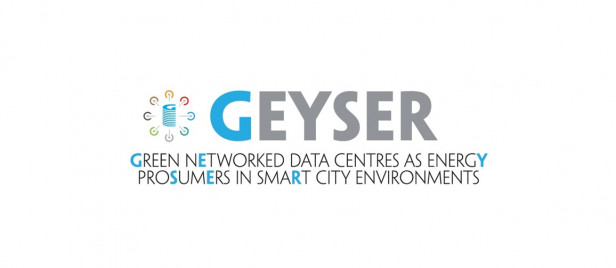The EU FP7 GEYSER project aims at supporting the energy transition within urban agglomerations by developing a technological and business framework to enable energy sustainable, networked Data Centres effectively interacting with Smart Grids and Cities. Hence, the project is solving two urban issues: energy efficiency and digital connectivity.
GEYSER

What is the goal of the project?
The EU FP7 GEYSER project aims at supporting the energy transition within urban agglomerations by developing a technological and business framework to enable energy sustainable, networked Data Centres effectively interacting with Smart Grids and Cities. Hence, the project is solving two urban issues: energy efficiency and digital connectivity.
What is the result of the project?
The idea, therefore, is for Data Centres to maximize their use of renewable energy at local level, while ensuring network stability. To that end, Data Centres take advantage of their own operational approaches, related to both energy and workload management, to offer flexibility in terms of their own energy consumption and production. In doing so, Data Centres are able to offer support services, such as ancillary and demand response services, specifically tailored to Smart Grid operators and other Smart City stakeholders, while considering optimized energy management initiatives.
This means that Data Centres can transform themselves into so called energy prosumers where they are both energy (conscious) consumers and producers. The GEYSER framework can therefore open the door for many new opportunities for the Data Centre sector, the energy sector and Smart Solution providers and as such contribute to their further development as open and innovative industries.
Who initiated the project and which organizations are involved?
GEYSER is an EU FP7 project with international partners, including two partners from the Netherlands, Green IT Amsterdam and Alticom Datacenters.
What is the next step?
The GEYSER project has come to its successful conclusion in October 2016. During the past three years, the GEYSER team was focused on delivering a technological and business proof-of-concept that supports Data Centres to interact with their smart city ecosystem.
A concrete summary of the validation and evaluation process, where collected results are analysed and presented in a uniform, consolidated way, can be found at http://www.geyser-project.eu/downloads/GEYSER.D7.6.RWTH.WP7.V1.0.pdf. This report delivers evidence on the achieved performance along with guidelines towards the development of a market-ready solution.
Feel free to browse the download section of the project’s website (http://www.geyser-project.eu/downloads/) for a wealth of information on the GEYSER solution architecture, optimization techniques and pilot results.
What can other cities learn from your project?
The tools for connecting intensive energy consumers and smart grids, energy markets and other energy consumers can be interesting for other cities.
One of the main technological tools developed is the GEYSER Optimization Engine: the “brains” of the GEYSER framework. It draws the plans to schedule data centre operations to meet high-level business or energy goals, locally or within the Smart City. Feel free to test drive a prototype instance already configured and up-and-running; it can be accessed at the following public address http://193.226.5.79/final-prototype/#/.




